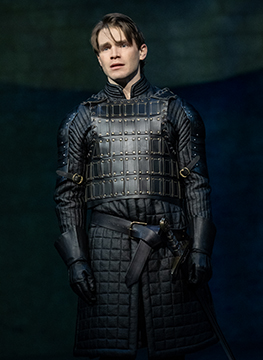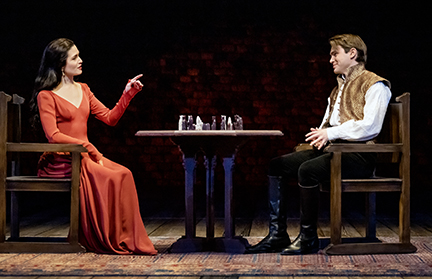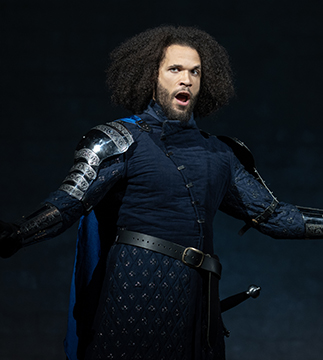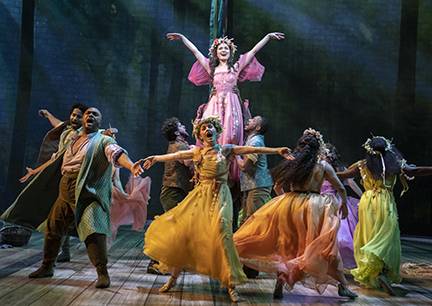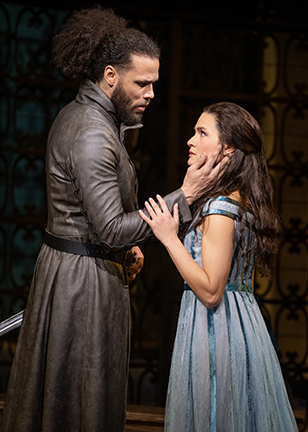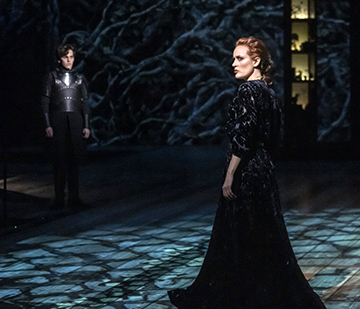By Lucy Komisar
Aaron Sorkin’s rethink of Alan Jay Lerner’s book of “Camelot” takes it smartly into the present, with more contemporary male-female attitudes and a heavy emphasis on social justice. The politics is solid, albeit presented in a hokey fashion (this is a musical), and the magical/mystical parts of the 1960 version have been cut, though the personal stories are still rather fanciful: the doomed romances are hard to believe. Just relish Frederick Lowe’s glorious music and Alan Jay Lerner’s sophisticated lyrics, overpowering and magical. And appreciate the politics in an era of Western warmongering.
First, note that King Arthur and his Roundtable at the center of the story were a legend. The musical “Camelot” (1960) was based on T. H. White’s “The Once and Future King” (1958), which was based on the 1485 “Le Morte d’Arthur” by Sir Thomas Malory. Modern writers added contemporary values such as democracy and justice. The Lerner and Lowe story focused on Arthur’s desire to create a new kind of knight that would not fight and pillage but uphold justice and honor: “Might for right.” Sorkin moves that along in a tale of idealism that, alas, ends in defeat. At least for the time.
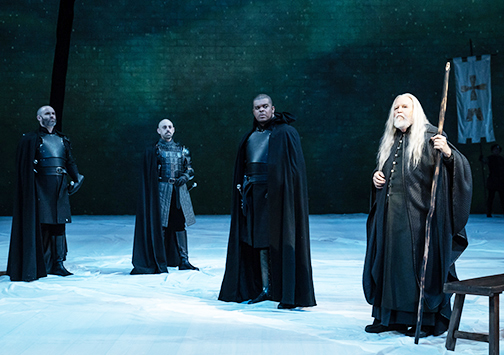
The knights, in black capes, are the old school. They are upset when the carriage bringing Guenevere to Arthur’s hill-top palace stops far below the entrance, breaking a thousand-year tradition. That doesn’t augur well for the stability of the military ruling class.
Arthur (Andrew Burnap) is shown as naïve, hiding in a tree because he is afraid to meet his intended bride. He complains to Merlyn the magician (Dakin Matthews) that he didn’t teach him about love. Guenevere (Phillipa Soo) is also hiding. She wants to experience years of maidenhood, adventure, romance before marriage. “The Simple Joys of Maidenhood” is our first chance to hear Soo’s charming, lilting soprano. They both act like college kids. And she is smart, maybe smarter than Arthur.
When they connect, they get into a discussion of power. She asks, “what good are kings?”
He replies, “They have a considerable amount of power.”
She: “And what is power for? It’s used to collect taxes and raise armies, am I correct?
He: “There’s nothing wrong with armies.”
She: “They’re used to conquer.”
He: “Also to protect.
She: “From other armies.”
If she stays, he says, they can prevent a war between England and France. And be a force for decency, civility, honor and justice. So, it’s an anti-war play. But wait, there are forces of evil lurking, the pre-deep state.
Guenevere replaces the myth of magic with the power of the people. Arthur tells how he got to be king. The old King died, left his sword Excalibur lodged in a rock and whoever pulled it out would be king. Arthur told her he was the 10,000th person to try, and he succeeded. Guenevere reminded him that the previous 9,999 had loosened it!
When Arthur claims, “We finally have peace,” Guenevere reminds him the troops continue to take villages and rape.
Meanwhile Merlyn tells him, “A powerful man determines to do good. . . things will get dangerous now.” Because the knights/military are not on board. Arrives the Frenchman Lancelot du Lac (Jordan Donica, Freddy Eynsford-Hill in My Fair Lady, with a terrific baritone.) Songs move the story perfectly. Lance, as he is called, has heard of Arthur and wants to join the cause, because, “where is a man so extraordinarie, c’est moi!” (It is I!)
We learn that the issue is not only fighting other countries, but class. (Sounds more and more like the U.S.) Watching a May 1st May Day dance, the knights grumble. Sir Sagramore (Fergie Philippe) says, “The festival is for members of court. I see stone masons here, cobblers, blacksmiths and a man who grows wheat.” He declares, “I’m the son, the grandson and the great-grandson of a duke. So are you and so are you. I’m not equal to a cobbler.”
Sir Lionel (Danny Wolohan) declares, “Equality is a myth made by the less-than-equal.”
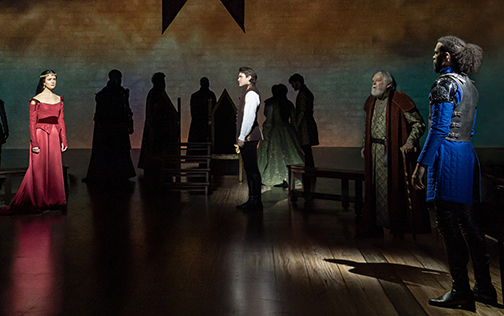
Sagramore replies, “The same problem Pharaoh had with the Hebrew slaves. There’s more of them than there are of us. The problem, Dinidan, is that it’s dangerous.” Sounds like the PMC (professional managerial class) and the military that run the U.S. Plus ça change.
Even the “good guys” have problems. Lancelot, portrayed by Donica as rather hammy, is a bit arrogant, domineering, sexist. He wonders if Guenevere might find complicated affairs of state rather tedious. By the way, Soo’s French accent is better than his. She asks if he has considered the value of humility.
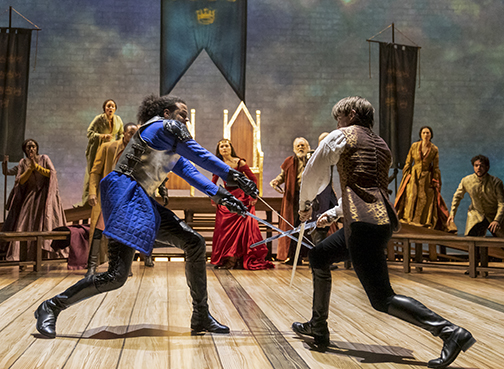
Then for some reason not satisfactorily explained, she changes personality, gets the three military leaders to become her escorts to major royal events if they will challenge Lancelot to sword competitions. Out of pique?
Meanwhile, Arthur is still perplexed about Guenevere, leading to the song “How to handle a woman.” Which tracks to Professor Higgins in “My Fair Lady.” (A lot of the songs conjure up past L&L shows.)
Arthur is also not altogether into the military part of the job. “We’ll begin the tournament now. Unless you’d all like to do something else. No?”
When it’s Arthur’s turn, he whispers to Lancelot, “I’m only doing this to help the knights save a little face. …It’s just about morale or, I believe, what the French call ‘esprit de corps.’ When this is over, we can all have lunch together.”
Lancelot seems to land a kill, but after some tense moments, Arthur gets up. “I wasn’t dead…I was unconscious.”
So far, lots of soft satire about militarism. And a social justice point about Pellmore (Dakin Matthews again), the homeless old man who has never slept in a house. Of course, he becomes the castle’s star boarder. A bit hokey. But it’s a musical.
Sorkin gets the politics perfectly. The one thing he and director Bartlett Sher don’t get right is the romance. You never sense love between Arthur and Guenevere or understand why she falls for Lancelot. Though that gives Donica the chance to sing another brilliant L&L song, “If ever I would leave you,” in a stunning operatic voice. Otherwise, Sher’s staging is flawless, almost cinematic.
Evil is personified by Mordred, (a perfectly malevolent Taylor Trensch), the son Arthur created at 15 from a one-night stand with Morgan Le Fey (Marilee Talkington) who now instead of a sorceress is a scientist (good), who drinks too much brandy (not good). When Mordred, now 14, arrives and threatens to tell all, Arthur admits the past and invites him to stay and learn about virtue. Mordred asks sarcastically if that includes fidelity. From that time, the guilty Arthur sends Morgan a letter a week, and money. Fast forward four years. I must admit I can’t believe this take on expiation of male guilt.
But the bad guys are out there. Sir Dinadan (Anthony Michael Lopez) declares, “Men are born unequal.” Sagramore: “Things are changing too fast!” Mordred riles them up to another great song “Fie on goodness!”
Arthur has been tricked into visiting Morgan. She tells him that in the new century, “There’ll be greed and injustice and hate and horror,” that “human nature responds to fear.”
And to betrayal. Guenevere’s weakness of the flesh leads Arthur to break the peace with France, the fighting begins, there will be war.
All is a fable/metaphor for current international politics. The knights are the British military fighting the French. But they are also the Americans who have contempt for the working class (the masons, the farmers), and spout justice but practice power. And fight pretty much anyone who doesn’t bend the knee.
An irony is that a few years after the show premiered, John F. Kennedy was killed, and Jackie Kennedy compared her husband’s presidency to King Arthur’s reign, noting his fondness for the musical. The elites used it to claim that the Kennedys had been the rulers of a Washington Camelot. But they must have meant Jackie redecorating the White House and hosting cultural figures, not John’s approving the Bay of Pigs invasion of Cuba or sending U.S. troops to Vietnam. Or maybe they didn’t see the show.
By the end of 1962, there were approximately 11,000 military advisors in South Vietnam. French president De Gaulle warned there would be an ‘Endless Entanglement.’ (Think of him as Lancelot.) Millions of Vietnamese would be victims, 60,000 Americans died. Sorkin’s “Camelot” is a vivid critique of U.S. warmongering that is as strong now as it was in the 60s. Even if the Kennedy crowd didn’t get it. And their political heirs don’t get it now.
About the legend: The elegant medieval Romanesque backdrop of bricks and arches (by Michael Yeargan) sets a time, but there is no historical evidence King Arthur existed, more likely that he was a fictional hero of folklore or a Celtic deity. Arthur is first portrayed as a leader of the Britons fighting Anglo-Saxon invaders in the 5th to 6th centuries. Books were written about him in the 12th-century in England and France, the first included Arthur’s wife Guinevere and the magician Merlin, the second added Lancelot and the Holy Grail. Fast forward a thousand years, the existence of an anti-militarist leader devoted to social justice is still a myth for Americans.
“Camelot.” Book by Aaron Sorkin, based on the original book by Alan Jay Lerner. Lyrics by Lerner, music by Frederick Loewe. Directed by Bartlett Sher, choreographed by Byron Easley. Vivian Beaumont Theatre at Lincoln Center, 150 West 65th Street, NYC. Runtime 2:55. Opened April 13, 2023. Open run. Video. #CamelotBway. @CamelotBway. Review on NY Theatre Wire.


